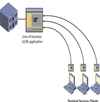Admission
This course is intended for new IT employees or Desktop Support workers moving into server support. The information in this course allows them acquire a fundamental understanding of Windows networks to pursue advanced topics. This course is also useful for those migrating from competitive platforms to Windows Server 2008.
Fundamentals of a Windows Server 2008 Network Infrastructure and Application Platform
| Exam # |
Duration |
Language |
Level |
Type |
Classroom |
Code |
Fees |
|
-- |
42 |
English |
Professional |
Course |
Classroom |
Cs375 |
0 LE |
Description :
This course introduces students to network infrastructure and application platform concepts and configurations provided by Window Server 2008. Students will be able to acquire a fundamental understanding in order to pursue advanced topics available for certification in the infrastructure or application platform services.
Objectives :
-
Describe the fundamentals of an enterprise networking environment.
-
Describe the typical roles of IT Professionals in an enterprise environment.
-
Describe TCP/IPv4 configurations, protocols, and tools.
-
Describe the fundamentals of communication technologies.
-
Create an IPv4 address range and subnet.
-
Configure IPv6 addresses.
-
Administer a Windows 2008 server.
-
Describe basic security concepts for server roles.
-
Describe how to secure network traffic by using certificates.
-
Configure Windows Firewall.
-
Configure and troubleshoot remote access.
-
Describe routing concepts, protocols, and quality of service.
-
Configure and test network load balancing.
-
Configure network print resources and printing pools.
-
Describe the functions included with Windows Server Virtualization (WSV)
Topics :
Fundamentals of Network Infrastructure
-
Network Communication Standards
-
Physical Network Infrastructure
-
Logical Network Organization
-
Overview of Active Directory
-
Server Roles
IT Professionals in the Enterprise
-
IT Professional Roles
-
IT Management and Processes
-
Professional Development for IT Professionals
TCP/IPv4 Fundamentals
-
Overview of the TCP/IP Protocol Suite
-
Overview of TCP/IP Addressing
-
Name Resolution
-
Dynamic IP Addressing
-
TCP/IPv4 Tools
Communication Technologies Fundamentals
-
Packet Delivery Methods
-
Network Content Types
Creating IPv4 Address Spaces
-
Overview of IP Communication
-
Subnetting for Complex Networks
IPv6 Fundamentals
-
Introduction to IPv6
-
Unicast IPv6 Addresses
-
Configuring IPv6
Fundamentals of Administering Windows Server 2008
-
Windows Server 2008 Administrative Tools
-
Monitoring Performance
-
Monitoring Events
-
Using Remote Desktop for Administration
-
Configuring Security for Server Administration
Security Fundamentals
-
Defense in Depth
-
Securing Access to Web Content
-
Securing Access to Files
-
Data Encryption
Fundamentals of Securing Network Communication
-
Public Key Infrastructure
-
Using Certificates
Windows Firewall and Caching Fundamentals
-
Overview of Perimeter Security
-
Windows Firewall Overview
-
Creating Windows Firewall Rules
-
Monitoring and Troubleshooting Windows Firewall
-
Demonstration: Monitoring Windows FirewalL
Remote Access Fundamentals
-
Remote Access Overview
-
RADIUS Overview
-
Network Policy Server
-
Troubleshooting Remote Access
Routing Fundamentals
-
Routing Fundamentals
-
What Is a Router?
-
Configuring RRAS as a Router
-
Quality of Service
Network Load Balancing Fundamentals
-
Network Load Balancing Fundamentals
-
Server Availability and Scalability Overview
-
Windows Network Load Balancing
-
Configuring Windows Network Load Balancing
Configuring Print Resources and Printing Pools
-
Configuring Print Resources and Printing Pools
-
Printing Overview
-
Configuring Network Printers
-
Using Print Management
-
Managing Printers
-
Troubleshooting Network Printing
Server Virtualization Overview
-
Server Virtualization Overview
-
Creating a Virtual Environment
Recommended Knowledge :
Before attending this course, students must have: A+, Server+, hardware portion of Net+, and familiarity with Windows (client side); Working knowledge of a Windows 2003 environment; Working knowledge of networking technologies.
Recommended Course(s) :
Network Security
Training Materials :
Microsoft Official Courseware (MOC)
Labs :
This course includes several labs to ensure you will gain the targeted skills and experience.
Credential :
This course is a credit towards Microsoft Certified Technology Specialist (MCTS)
Category :
The Instructor:
